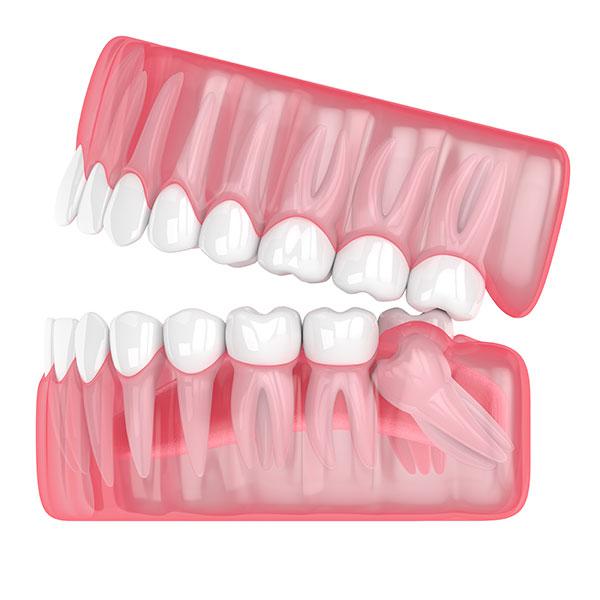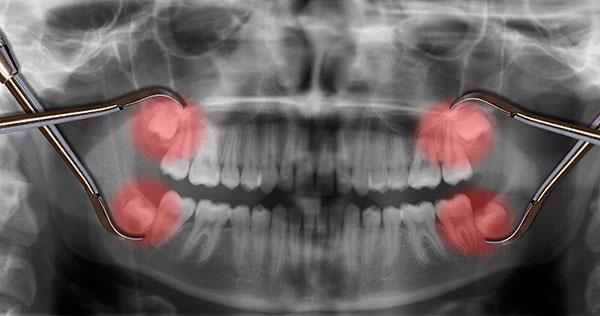 What is wisdom teeth extraction?
What is wisdom teeth extraction?
The wisdom tooth or the third molars are the last back teeth in your jaw. These teeth have a tendency to erupt at unusual angles and tend to be involved in diseases that lead to pain and other associated symptoms. This necessitates the need for their removal.
Wisdom teeth tend to be partially or fully impacted in the jawbone. Therefore, usual extraction procedures cannot be undertaken. Wisdom teeth removal has to be undertaken surgically. To know more about wisdom teeth removal, keep reading ahead.
Who needs wisdom teeth extraction?
If your wisdom teeth sit comfortably in your jawbone and have come out in their normal position, you may never need to undergo its removal. However, if your wisdom teeth get involved with dental decay or periodontal diseases, it may need to be extracted.
Wisdom teeth that are partially erupted or completely embedded in the jawbone have to be removed as these teeth tend to cause pain. In addition, the overlying gums can get infected as this area is also difficult to keep clean. In some cases, third molars can also be involved with some pathology, such as a cyst. If this happens, their removal becomes necessary and is often an emergency procedure to ensure it does not lead to complications.
How to prepare yourself for wisdom teeth surgery?
 If you think you may need to get your wisdom tooth removed, please consult our oral surgeon - Dr. Alexander Kim today. A complete oral and systemic examination becomes necessary to analyze the cause of discomfort as it guides the entire treatment.
If you think you may need to get your wisdom tooth removed, please consult our oral surgeon - Dr. Alexander Kim today. A complete oral and systemic examination becomes necessary to analyze the cause of discomfort as it guides the entire treatment.
Radiographs allow your surgeon to understand the position of your teeth inside the jawbone, the amount of bone that will need to be removed, and whether it is adjacent to a nerve or any other vital structure. Our oral surgeon will suggest specific radiographs, which may include a chairside radiograph, an OPG, or, if needed, even a CBCT. Post this, they will plan your treatment and post you for the surgery.
Third molar removal is usually done under IV sedation, which puts you to sleep and will require you to have an empty stomach from the night before, at least 8 hours before the procedure. In some cases, it may be done under local anesthesia.
If you are feeling anxious or have any concerns regarding your procedure, please contact us, and we will ensure all your concerns are alleviated. It is also essential to remember that wisdom tooth extraction is done to eliminate your pain and not cause it. The anesthesia will ensure you are comfortable and pain-free during the entire procedure. So, take a deep breath and relax.
You would have to bring a driver with you who must be present at all times during your surgery and drive you home afterwards. You should not drive any vehicle or operate any kind of machinery within 24 hours after your surgery. Third molar removal is an outpatient procedure, but you will still need someone to drive you home after the procedure as there may be residual effects of anesthesia which makes driving unsafe.
Wear loose and comfortable clothes on the day of your surgery. Do not consume alcohol for at least 2-3 days before your surgery. The same rule applies to smoking and consumption of tobacco. Make sure you have a good night's sleep the day before your procedure to avoid any unnecessary stress.
What happens during surgery?
The procedure begins with anesthesia. A local anesthetic agent will be used to numb the intended area. IV sedation may be recommended. In such a situation, you are put to sleep, so you won't be able to perceive any aspect of the surgery.
Once adequate anesthesia is achieved, your oral surgeon will make a precise on the gum over the embedded third molar. The soft tissue is reflected. A specialized drill is used to remove the required amount of bone. Next, elevators will be used to luxate a tooth out of the socket. A forceps is used to remove the tooth from the socket. Sometimes, the tooth may have to be cut in two or three parts to ensure proper removal. Next, the socket is cleaned, and the bone is smoothened out. The opened incision is closed with the help of sutures.
 What are the post-operative instructions, and how long does the recovery take?
What are the post-operative instructions, and how long does the recovery take?
-
You may experience some swelling after your procedure which is completely normal. Use an icepack from the outside of your cheek. This will help reduce the swelling and provide you relief.
-
You will be prescribed antibiotics and painkillers. Please ensure you take them as instructed for pain relief and uncomplicated healing.
-
Do not spit out the blood or saliva forcefully.
-
Do not consume anything at a hot temperature, as it can worsen the swelling and the pain.
-
Consume foods and liquids at cold or room temperature only for the first week.
-
Consume a liquid or soft diet for the first week.
-
Avoid any hard food such as chocolates, carrots, steaks, etc. instead, consume soft and protein-rich foods such as eggs, yogurt, protein shakes, etc.
-
You will have to come in for follow-ups and suture removal. These follow-ups are done to ensure you are healing well, and if any complication occurs, it can be dealt with swiftly.
-
Avoid strenuous exercise and physical stress for 2-3 days after your procedure. Take rest on the day of your procedure, and you can continue your normal routine from the next day.
-
If you experience exaggerated pain or keep bleeding, please get in touch with us immediately.
You may have some discomfort and swelling for 2-3 days after surgery. The surgical site should heal completely within 10-12 days.
Please contact us if you have any more questions or wish to schedule an appointment with us at Phoenix Oral and Facial Surgery. Our team of excellent medical and dental professionals is here to assist you.

